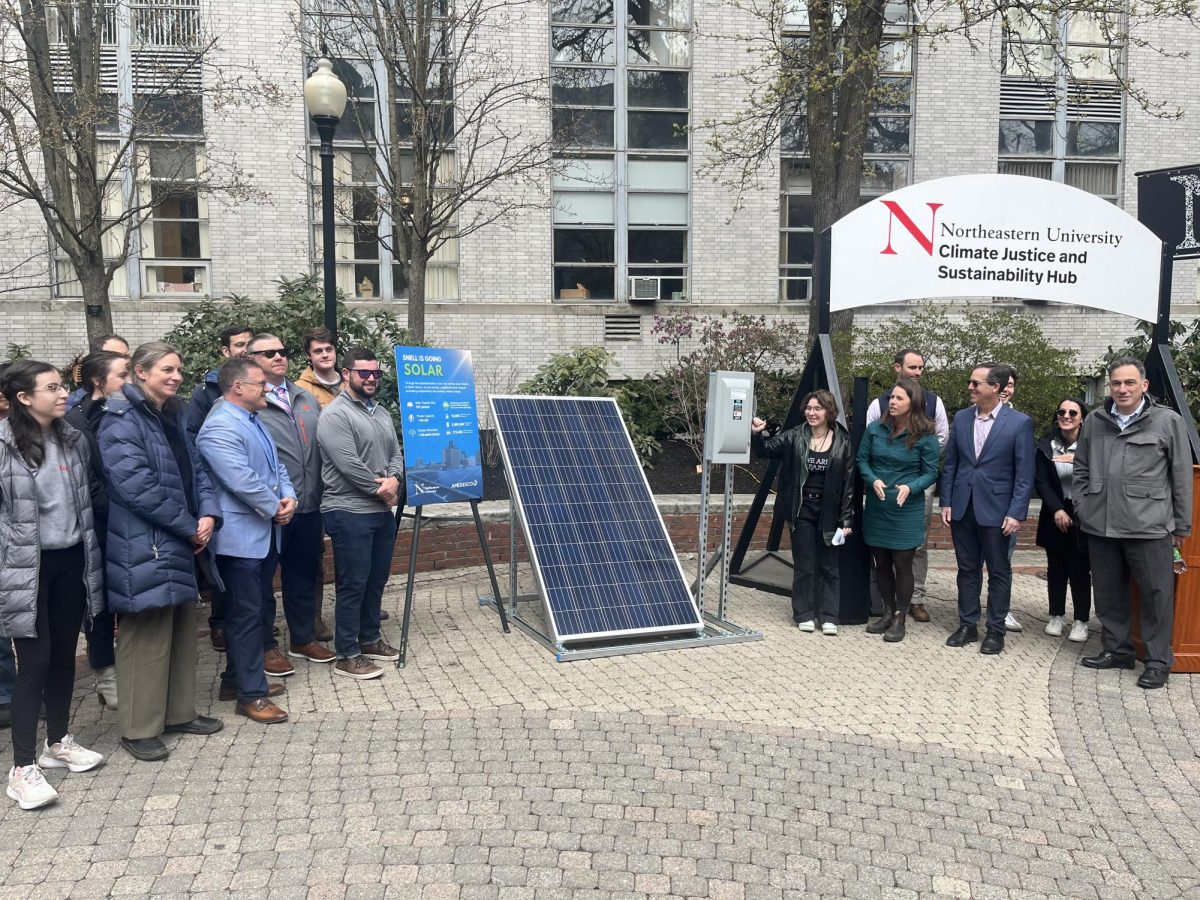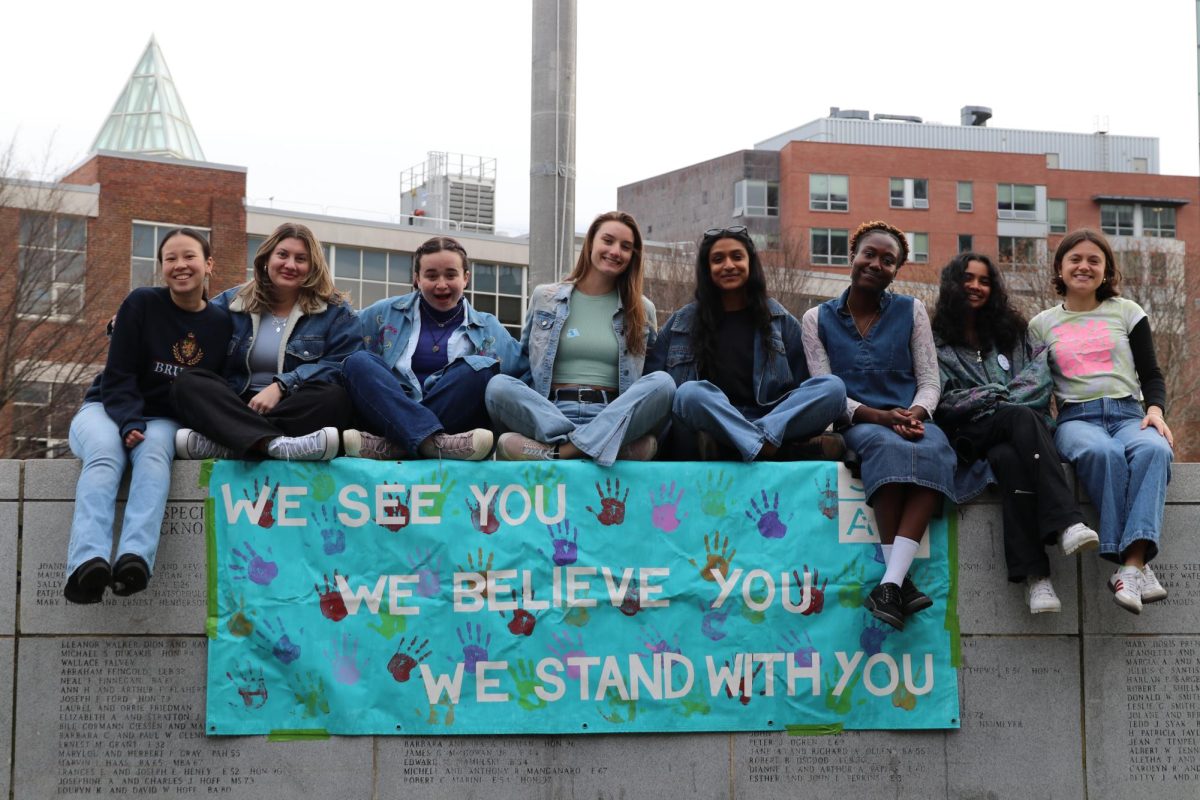By Miharu Sugie, News Staff
Student Government Association
SGA Chief of Staff Joshua Trowbridge, sophomore majoring in mechanical engineering
The Huntington News: What is Student Government Association?
Joshua Trowbridge: We serve to represent the voice of the students to senior administration through people who have volunteered to represent their college or student group on campus, a form of constituency to us to then give us their voice. It’s a way of communication between students and the upper management faculty staff of Northeastern. It’s like student government in high school, but college-level.
HN: What are SGA’s plans or goals for 2013-2014?
JT: I can’t let you in on a ton, but I will tell you that the executive cabinet is really motivated this year, we’re looking to change a lot, we have some various ideas about different resources on campus, trying to restructure ourselves to better facilitate our students. It’s really up to the people to tell us what they want. We can’t really set goals like ‘we want this or this.’ It’s more of tell us what you guys want to change and we’ll work towards changing it. I know definitely that coming from a social, student services background, that there are lot of environmental issues that people want to address on campus, like single stream recycling, one to one ratio of recycling bins on campus, but also different academic things.
HN: Were there any significant changes to SGA since last year?
JT: We have a lot of new cabinet members, myself included, so that’s definitely going to be a positive vehicle for change within the cabinet but also within student government … I think change comes from the people. As we get new people, we’ll definitely get new ideas and new energies that we’ll be able to channel into creating a change.
HN: Why is SGA important to the Northeastern community?
JT: Our purpose is to give students a voice to faculty senior leadership. That’s what I think is our most important facet. Say, some random student … doesn’t go to President Aoun’s office or [a] vice president’s office and just starts talking to them about random things. It’s not something they do or usually can do on any random day about any particular issue, nor would one student’s opinion really carry much influence to these people. It would certainly be interesting and they’ll probably appreciate it, but it’s the simple fact that we’re representing the student body and we can have those lines of communication between us and senior leadership that makes us valuable. Plus, we put on really cool programs.
HN: How can students join SGA?
JT: Easy. We have Senate meetings every Monday at 7 p.m. [in 332 Curry Student Center] which you could come to. You don’t have to be a senator to come to them. If you want to be a senator, we have forms on OrgSync they’ll need to fill out and then you’ll have to get a senator nomination form that you’ll have to fill out yourself and send it off to us via OrgSync and all that is just showing us your interest, who you are, a little bit about yourself and … a list of 30 signatures of constituency. And after that, really, come to Senate, join two committees or do some office hours and help make the world a better place.
Resident Student Association
Becca Vanderwall, fourth year biology major, president
The Huntington News: What is Resident Student Association?
Becca Vanderwall: We are the RSA and we basically have three main focus areas we work on campus. They [include] programming, which is our biggest one, we program for all of the Northeastern residents, big and small programs, to entertain and educate residents to make their resident experience as good as it can be. The next focus area is leadership. [It is] mostly within our general council but anyone who would like to build their leadership skills or find something that they really want to do during their time at Northeastern, we go on conferences and … try to build leadership skills with our general council. And lastly, advocacy. We’re kind of one of the main student bodies who works to advocate for students by being a liaison between students and administration. If there are housing problems or dining problems that residents have, we help bring those ideas to administration. We’re kind of the main body for working on gender-inclusive housing.
HN: What are RSA’s plans or goals for 2013-2014?
BV: Something that we always work on that’s been a personal goal of mine is really to just reach [out to] more residents. Northeastern is a very busy campus with a lot of individuals who are all over the place. So, really, just to figure out what all of our residents want and to be able to cater to that a little better.
HN: The RSA hosted the ResHall Carnival on Sept. 1. How was it?
BV: We always have that in the beginning of the year. The main educational piece of it is to really teach the freshmen who are coming in what they can and can’t have in their residence halls and how to make their resident experience the best they can be. We had some great games. We had one with hockey and recyclables and they had to use brooms to hit the recyclables into the bins … and we had music, free food, we had the food truck for a little while, a good mixture of the educational piece and the entertainment piece. The first half of the event was in Stetson East Living Learning Communities but we actually got a really good turn out still. We also had alarm clocks, pillows, a bunch of RSA swag to give out, of course.
HN: What is RSA’s catchphrase?
BV: Our official one is ‘your voice in the halls.’ So, within the residence halls we become a voice for anyone who lives on campus.
HN: Were there any significant changes to RSA since last year?
BV: Nothing that is too huge for the general body. We have done some changes within our executive board, changing whose role is what so we can do what we do best.
HN: Why is RSA important to the Northeastern community?
BV: RSA for me has really been a place that I’ve been able to find myself in at Northeastern. I found that RSA is somewhere I can grow with great leaders at Northeastern and that I can really be a voice at Northeastern. So, I think that one of the main strengths we have is that we know how to create leaders on this campus and that anyone who has any idea for a change at Northeastern can make that change.
HN: How can students join RSA?
BV: It’s really easy. You just have to come to one of our RSA meetings which are on Wednesdays at 7:30 pperiodm. And from there, to have full voting privileges, there’s a petition they have to have signed by people who live in their resident residence hall. To be a full voting member you do have to be a resident at Northeastern’s residence halls. You just have to fill in that petition and as long as you come to three fourths of our meetings, you can become a voting member.
NU Husky Environmental Action Team
Co-Executive Director Devon Grodkiewicz, a third year in environmental studies and business entrepreneurship dual major.
Co-Executive Director Sarah Sanchez, a senior civil engineering and environmental science dual major
Director of Marketing and Public Relations Natalie Wheeler, a third year communications major
The Huntington News: What is Husky Environmental Action Team?
HEAT: HEAT is a student organization focused on promoting sustainability and environmental advocacy on campus and throughout our community. Be it gardening in the Fens or increasing recycling at Northeastern, we strive to empower students to use their talents and ambition to advance sustainability at Northeastern.
HN: What are HEAT’s plans or goals for 2013-2014?
HEAT: We are going to be starting a Monthly Speaker Series during our regular meetings, giving students the opportunity to meet local activists working on initiatives for a greener Boston. Our committees will be taking on some exciting projects, like vermiculture (worm composting) and Green Office, a program designed to increase sustainability in campus offices. In addition, last semester, we joined the global divestment movement. On campus, we are working to encourage Northeastern to cease all investments in the fossil fuel industry. We have a lot of momentum and want to capitalize on our members’ enthusiasm for this issue.
HN: What is HEAT’s catchphrase?
HEAT: Making Northeastern as green as it is black and red.
HN: Were there any significant changes to HEAT since last year?
HEAT: In years past, we had our annual energy saving competition, Do It In The Dark. However, this year, we are revamping the program into something bigger and better — just wait and see.
HN: Why is HEAT important to the Northeastern community?
HEAT: As much as Northeastern has risen in the ranks of sustainable universities, with the construction of new buildings like International Village and signing on to the Real Food Challenge, serving 20 percent local food in dining halls by 2020, we wish to connect students themselves to the tools and opportunities needed to become motivated activists on campus and in the world. Whether you are more interested in learning about environmental issues or even acting on them, HEAT provides opportunities for all kinds of students.
HN: How can students join RSA?
HEAT: HEAT meets weekly on Wednesdays at 7:15 pm in 104 West Village G. It’s a ton of fun and new members are always welcome. If you want to be added to the weekly email list, shoot an email to [email protected] or follow us on Facebook (facebook.com/northeasternheat) or Twitter (@HEATNU). We hope to see you there.
Progressive Student Alliance
Troy Neves, co-chair of PSA’s Campus Worker Justice campaign, a sophomore majoring in sociology
The Huntington News: What is Progressive Student Alliance?
Troy Neves: The PSA is a student solidarity group. We work towards human rights through the alliance of workers’ rights.
HN: What is PSA’s plans or goals for 2013-2014?
TN: Since Northeastern is such a large university, it’s important that workers from all different spectrums are, the university’s held accountable for workers from all different spectrums. We recently found that the adjuncts are coming together and forming a union and we’re in complete support of that as the PSA. [Our goal is to] show our support and do our best to support the workers on our campus.
HN: What is PSA’s catchphrase?
TN: Adjunct working conditions are student learning conditions.
HN: Were there any significant changes to PSA since last year?
TN: Last year we had a larger focus on international solidarity work but this year we’re bringing it back home to our campus. We haven’t always been as focused as a group as we are now but we found that collectively our goals aligned and we found the best way to reach those goals and get what we feel is necessary is that we work for human rights through labor rights.
HN: Why is PSA important to the Northeastern community?
TN: I feel that it’s important that a space is created for students, workers and the administration to all come together and work collectively to better our university.
HN: How can students join RSA?
TN: We have meetings every Tuesday at 7:15 pm. Our first one is next Tuesday, Sept. 10. You can always email us at [email protected] or you can check our Facebook page … that will give you day-to-day updates.













